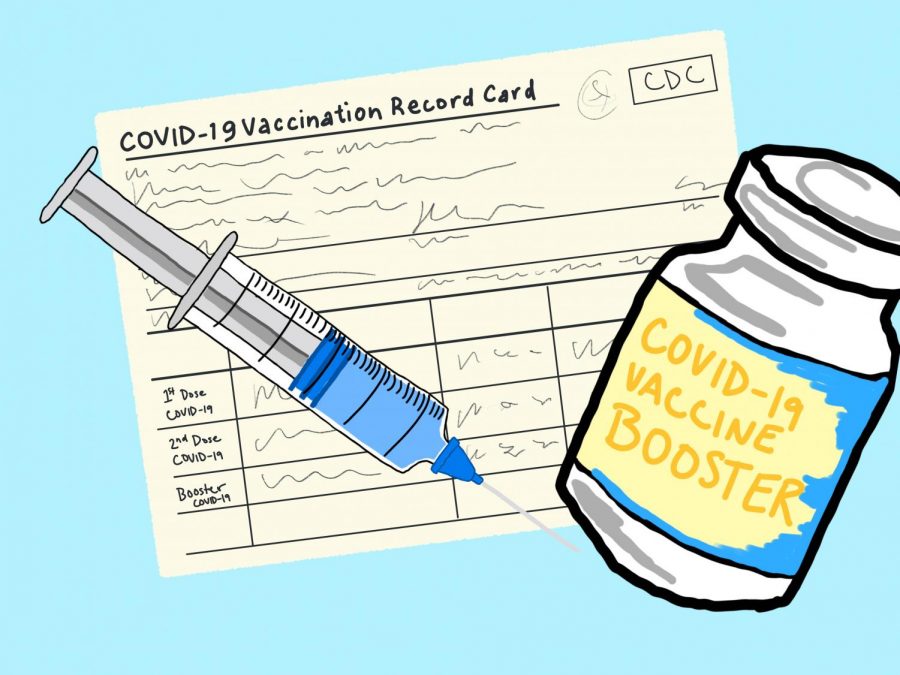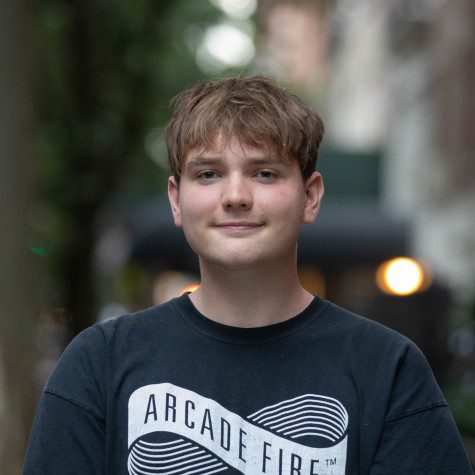Explained: COVID-19 booster shots, and who can get one
The CDC’s recent booster shot recommendation left members of the NYU community wondering who is eligible to receive an extra dose of the COVID-19 vaccine.
On Oct. 4, the CDC recommended a booster shot of the Pfizer-BioNTech for those who received their second dose at least six months ago. This left members of the NYU community wondering who is eligible to get their third shot. (Staff Illustration by Manasa Gudavalli)
October 14, 2021
Editor’s note: This article was published in October 2021. Guidelines and requirements from NYU and the Centers for Disease Control and Prevention may have since changed.
On Oct. 4, the Centers for Disease Control and Prevention recommended a booster shot for people who received their second dose of the Pfizer-BioNTech COVID-19 vaccine at least six months ago. The CDC defined three groups who are eligible: people aged 65 years and older, people aged 18 to 64 with underlying health conditions and people aged 18 to 64 with increased exposure to COVID-19 at high-risk settings and jobs.
Joseph Palamar, an associate professor at the Department of Population Health at NYU Langone, said he received a booster shot to protect himself from a breakthrough infection of COVID-19 — vaccinations are not required to enter restaurants, bars and other businesses near his home outside of New York City.
“I was in a crowded bar for different dates seven days in a row,” Palamar said. “That can place someone at pretty high risk for exposure even when vaccinated. I was happy to hear the booster was coming out as it means more protection for me, and in turn, more protection for others around me.”
After the CDC recommendation, NYU’s COVID-19 Prevention & Response Team said that it would contact New York City’s Department of Health and Mental Hygiene to confirm that university faculty fell into the high-risk category.
“The phrase ‘teachers’ was put out as part of [the criteria],” Carlo Ciotoli, who leads the CPRT, said in a webinar to faculty. “They said that they felt that the intention of that was really K-12. There may be some flexibility on that, so I would say stay tuned.”
Gallatin sophomore Katie Lam does not have an underlying health condition, but said she is unsure about how the CDC defines high-risk exposure, and if she would be eligible for the booster shot in the future.
“I would assume jobs such as teachers and medical staff would be eligible under that, but honestly I don’t know,” Lam said. “Maybe it’s due to [the CDC] not truly knowing either. I really wish they gave a more in-depth list for the exposure part.”
Currently, Pfizer is the only vaccine manufacturer for which the CDC has approved a booster shot. Arthur Caplan, a bioethics professor at the Grossman School of Medicine, said many fully vaccinated individuals who received the Moderna or Johnson & Johnson vaccines are wondering whether it is safe to get the Pfizer shot. The U.S. Food and Drug Administration is currently reviewing the efficacy of receiving a booster shot from a different COVID-19 vaccine than what was initially administered.
“I wouldn’t try to participate in that experiment — there is no information on that,” Caplan said about mixing vaccines. “I’m not worried about the side effects, but I’m worried that for some reason or another, they literally will not kick up the immunity again.”
While NYU is not yet asking students, faculty and employees to upload proof of receiving a booster shot, the university encouraged those who are eligible for the extra dose to receive it at the Student Health Center, where appointments are currently available, or from an external health provider.
Contact Kristian Burt at [email protected].




























































































































































